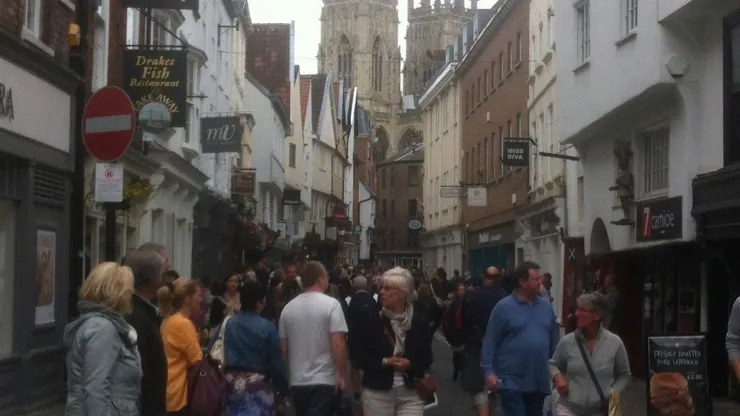Last weekend was a surreal one for me. I spent most of the afternoon in York, as well as the morning in Edinburgh and the evening in Manchester. It was surreal because I was there on a Premier League Saturday, but there was little to no evidence of anything Premier League-related going on in the country that is the home to the world’s most popular sports league (and the birthplace of the game).
In some ways, I shouldn’t be surprised. The nearest Premier League team to York is Hull City, 41 miles away. Neither Hull City, Manchester City nor Manchester United had a home match last Saturday. Plus, as bad luck would have it, none of the Football League games near where I was traveling were playing home that day either.
As I was walking through the streets of York, mingling with thousands of local residents (and many tourists) doing their Saturday shopping, it was almost as if the Premier League didn’t exist. The only visible signs I saw of its existence were (1) the handful of middle age to older men standing in the tiny betting shops as they stared, without any emotion, at the TV monitors displaying the latest scores, and (2) a pair of people wearing Hull City shirts, as they walked through the hordes of shoppers filling the streets of the Yorkshire city.
Again, I shouldn’t be surprised. None of the 3pm UK time kickoffs are shown on television due to the nationwide TV blackout, so if you want to see a match, you have to go to a game.
I’m not entirely sure what I was expecting, but I was bitterly disappointed. Perhaps I was expecting to see sports bars with flat-screen television sets tuned to Sky’s Soccer Saturday program, as nervous fans looked on as Chris Kamara, Phil Thompson, Jeff Stelling and Paul Merson “carried them away.”
I stopped inside a pub next to the railway station, half expecting that there would be TV sets tuned to Sky Sports or another channel. But there was nothing. There were a few dozen customers sitting down, having a pint and talking about everything in the world except football. The only evidence that Premier League matches were being played was a mention by one of the bar staff to his colleague that Stoke City had lost to Leicester City.
As timing would have it, I was traveling by train when the only two Premier League matches were on television in the UK that day. When Arsenal played Manchester City, I was on a train from Edinburgh to York. None of the passengers or train staff mentioned the game. It was as if it wasn’t happening. The only way I could stay connected to the game was via a live vidiprinter via the WiFi on board.
A similar experience happened later in the day when I was traveling by train from York to Manchester Airport. The passenger next to me was keeping an eye on the score for Liverpool-Aston Villa on his mobile phone, so he could keep his son updated. With just one goal scored, the ten seconds they discussed the game was the only football “banter” I had heard all day.
If I had been in a city where there was a Premier League match scheduled, or if I was in a bigger, more cosmopolitan city, then the discourse would have been much different. But I wasn’t, so what I was reduced to was a lonely Premier League Saturday experience given I was nowhere near a television, a phone or radio.
What the experience reemphasized to me was the continued importance and power of Match of the Day. If you’re like most Brits that are not at a match or glued to a TV set watching Sky Sports News, your main source of soccer highlights, news and analysis is the episode of Match Of The Day, shown every Saturday night at 10.30pm local time.
For those busy shoppers in York, or the locals commuting by train, they know that they can go about their busy day and get stuff done, and then switch on BBC One at 10.30pm to watch everything they need to see from that day’s action (followed by a similar show focused on the Football League).
For someone like me who has spent his last 30 years in the United States, and who has spent the last 15 years spoiled by the quality and quantity of Premier League games shown on US television, being in England on a Premier League Saturday felt like such a strange experience. It’s not as if the Premier League is so pervasive in the United States that you can see it on every street. But if you walk into a pub or sports bar, you’re more than likely to see a game on a TV screen and soccer fans wearing shirts of their favorite teams.
It’s a strange feeling when the Premier League and the sport of football is practically invisible on the streets of a city on a busy Saturday matchday. Next time, I’ll have to make sure to go to a Premier League match so I’ll feel like I’m more at home.
200+ Channels With Sports & News
- Starting price: $33/mo. for fubo Latino Package
- Watch Premier League, Women’s World Cup, Euro 2024 & Gold Cup
The New Home of MLS
- Price: $14.99/mo. for MLS Season Pass
- Watch every MLS game including playoffs & Leagues Cup
Many Sports & ESPN Originals
- Price: $10.99/mo. (or get ESPN+, Hulu & Disney+ for $14.99/mo.)
- Features Bundesliga, LaLiga, Championship, & FA Cup
2,000+ soccer games per year
- Price: $5.99/mo
- Features Champions League, Serie A, Europa League & Brasileirāo
175 Premier League Games & PL TV
- Starting price: $5.99/mo. for Peacock Premium
- Watch 175 exclusive EPL games per season






